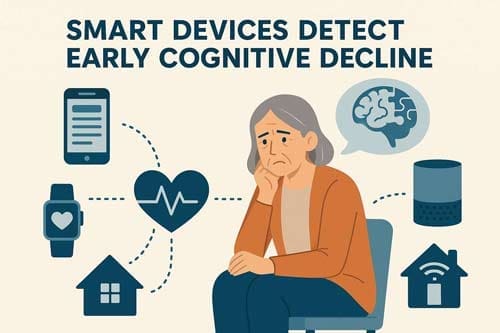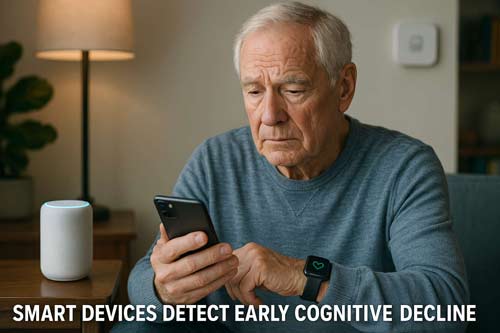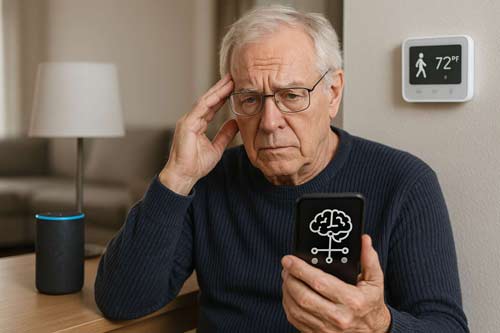Smart Devices Detect Early Cognitive Decline
Please like and subscribe if you enjoyed this video 🙂
Abstract
This paper explores the growing potential of smart technology in the early detection and monitoring of cognitive decline. As the prevalence of dementia and Alzheimer’s disease continues to rise, there is increasing interest in how everyday digital devices such as smartphones, smartwatches, and wearable sensors can support cognitive health assessment outside of traditional clinical settings.
Early identification of cognitive impairment is critical for timely intervention, yet conventional diagnostic tools are often limited to periodic clinical assessments, which may miss subtle, progressive changes. Smart devices offer a new avenue for continuous, real-time monitoring, providing valuable insights into behavioral and cognitive patterns over time.
Smartphones and wearable devices can passively collect data on a user’s speech, typing patterns, gait, sleep, mobility, and daily routines—factors that may reflect early cognitive changes. For example, declines in reaction time, changes in communication habits, or reduced physical activity may signal the onset of cognitive impairment. When analyzed through artificial intelligence and machine learning algorithms, this data can help identify early warning signs of conditions like Alzheimer’s disease.
Recent studies have shown promising results in using smart technology for early detection. Pilot programs using smartphone apps and wearable trackers have demonstrated the feasibility of capturing cognitive-related metrics, often before symptoms become clinically apparent. These technologies also enable remote monitoring, reducing the need for frequent in-person visits and supporting continuity of care, especially for at-risk populations.
However, limitations include data privacy concerns, variability in device accuracy, lack of standardization, and digital literacy barriers among older adults. Further research is needed to validate device-based assessments against established clinical tools and to ensure ethical data handling.
The integration of smart technology into cognitive health monitoring represents a shift toward more personalized, preventative care. Clinicians must become familiar with interpreting digital biomarkers and incorporating them into broader diagnostic and care strategies. Collaboration between healthcare providers, researchers, and technology developers will be essential to maximize the utility and safety of these tools.
Introduction
Cognitive decline represents an emerging public health concern, especially as the global population ages. Early identification of cognitive impairment is vital, as it allows for timely interventions that can improve patient outcomes and potentially delay the progression of neurodegenerative conditions such as Alzheimer’s disease. Traditional cognitive assessments typically conducted during scheduled clinical visits are limited by their episodic nature and may fail to capture subtle or gradual changes in cognitive function.
In contrast, smart devices offer a novel and scalable approach to cognitive monitoring. These technologies ranging from smartphones and wearable sensors to smart home systems can passively and continuously collect data on behavior, speech, mobility, sleep, and other daily activities. By analyzing these data in real time or over extended periods, clinicians can detect early deviations from an individual’s baseline that may signal emerging cognitive decline.
Integrating smart technology into cognitive health monitoring not only enhances sensitivity and timeliness of detection but also enables personalized, real-world assessment outside the confines of clinical settings. This shift holds the potential to transform early diagnosis, support ongoing disease management, and ultimately improve quality of life for individuals at risk of or living with cognitive disorders.

Smart Devices and Cognitive Monitoring
- Speech patterns: Changes in speech can be a significant indicator of cognitive decline. Smart devices, particularly smartphones, can use specialized apps to analyze various aspects of speech:
- Vocabulary richness: A reduction in the variety of words used may indicate cognitive issues.
- Speech rate: Changes in the speed of speech, either becoming slower or more erratic, can be a warning sign.
- Pauses and fillers: An increase in the use of filler words (like “um” or “uh”) or longer pauses between words might suggest cognitive difficulties.
- Pronunciation: Subtle changes in how words are pronounced can be detected by advanced speech recognition algorithms.
- Semantic coherence: AI-powered analysis can assess the logical flow and coherence of spoken sentences.
These speech analysis tools can work in the background during phone calls or through specific voice recording exercises, providing a non-invasive way to monitor cognitive function over time.
- Movement and gait: Wearable devices, such as smartwatches or specialized sensors, can track various aspects of movement that may indicate cognitive impairment:
- Walking speed: A gradual slowing of normal walking pace can be an early sign of cognitive decline.
- Stride length: Shortened steps or inconsistent stride length may indicate neurological changes.
- Balance: Subtle changes in balance, detected through accelerometers in wearable devices, can be linked to cognitive issues.
- Arm swing: Reduced or asymmetrical arm movement while walking can be an early indicator of neurological problems.
- Turning: The smoothness and speed of turning while walking can provide insights into cognitive function.
- Dual-task performance: Some devices can assess how well a person maintains their gait while performing a cognitive task, such as counting backwards.
These movement parameters are monitored continuously during daily activities, providing a comprehensive picture of any changes over time.

Evidence Supporting Smart Device Detection
Recent research highlights the growing potential of smart devices in the early detection of cognitive decline, offering non-invasive, scalable tools that can supplement traditional assessments:
- A 2020 study in the Journal of Alzheimer’s Disease reported that smartphone-based cognitive tests reliably identified individuals with mild cognitive impairment (MCI) and early-stage Alzheimer’s disease.
- In 2021, researchers at the University of Cambridge demonstrated that gait analysis using wearable sensors could predict cognitive decline in older adults with 90% accuracy over a two-year follow-up.
- A large-scale study by the Digital Health Institute in 2022, involving more than 10,000 participants, found that continuous monitoring of daily smartphone usage patterns could detect subtle cognitive changes up to 18 months earlier than conventional screening tools.
Together, these findings underscore the value of integrating digital health technologies into routine cognitive monitoring, potentially enabling earlier interventions and improving long-term outcomes.
Applications for Healthcare Professionals
- Early intervention: Detecting cognitive decline earlier allows for more timely interventions and treatment plans. This expanded capability offers several benefits:
- Medication effectiveness: Early detection allows doctors to prescribe cognitive-enhancing medications when they are likely to be most effective.
- Lifestyle modifications: Healthcare professionals can recommend targeted lifestyle changes, such as specific cognitive exercises or dietary adjustments, before significant decline occurs.
- Safety planning: Early awareness of cognitive issues allows families and healthcare providers to implement safety measures, such as medication management systems or home modifications, proactively.
- Clinical trial eligibility: Identifying cognitive decline early may qualify patients for cutting-edge clinical trials or research studies.
- Financial and legal planning: Early detection gives patients and families more time to address important financial and legal matters while the patient can still participate fully in decision-making.
- Continuous assessment: Smart devices provide ongoing monitoring, offering a more comprehensive view of cognitive function compared to periodic clinical evaluations:
- Daily fluctuations: Continuous monitoring can reveal patterns in cognitive function, such as time-of-day effects or responses to stress or fatigue.
- Subtle changes: Small shifts in cognitive performance that might not be noticeable in occasional tests can be detected through ongoing data collection.
- Trend analysis: Long-term data allows healthcare professionals to distinguish between normal age-related changes and more concerning cognitive decline.
- Contextual information: Continuous monitoring can provide insights into how various factors (like sleep quality, physical activity, or social engagement) correlate with cognitive performance.
- Rapid response: Sudden changes in cognitive patterns can be flagged quickly, allowing for prompt medical evaluation if needed.

Comparison with Traditional Assessment Methods
Smart device-based cognitive monitoring offers several advantages over traditional assessment methods:
- Frequency: While traditional cognitive tests are typically administered annually or less frequently, smart devices can provide daily or even continuous monitoring.
- Natural setting: Smart devices collect data in the patient’s everyday environment, potentially offering more accurate insights than clinical settings.
- Objectivity: Device-based measurements are less subject to human error or bias compared to some traditional assessment methods.
- Sensitivity: Continuous monitoring may detect subtle changes that might be missed in periodic assessments.
However, traditional methods still have advantages in terms of comprehensive evaluation and clinical expertise. A combination of smart device monitoring and traditional assessments may provide the most comprehensive approach to cognitive health evaluation.
Challenges and Limitations
Despite the potential benefits, there are several challenges and limitations to consider:
- Privacy concerns: Continuous monitoring raises questions about data security and patient privacy.
- Technical issues: Device malfunctions or user error could lead to inaccurate data or missed information.
- Accessibility: Not all patients may have access to or feel comfortable using smart devices.
- Over-reliance on technology: There is a risk of healthcare providers becoming too dependent on device data at the expense of clinical judgment.
- False positives: The sensitivity of smart devices may lead to false alarms, causing unnecessary anxiety for patients.
- Validation: More large-scale, long-term studies are needed to fully validate the effectiveness of smart device-based cognitive monitoring.

Conclusion
Smart devices are emerging as powerful tools in the early detection of cognitive decline, offering continuous, real-world monitoring that traditional clinical assessments cannot easily replicate. These technologies ranging from wearable sensors to smartphones and home-based systems can track subtle changes in behavior, movement, speech, and sleep patterns that may signal early cognitive impairment. By capturing data in real time and in natural environments, smart devices have the potential to transform how cognitive health is assessed, enabling earlier interventions and more personalized care.
However, while their benefits are clear, smart devices should be seen as complementary to—not a substitute for—comprehensive clinical evaluations. They can enhance early screening and ongoing monitoring, but they do not replace the diagnostic accuracy and contextual judgment of trained healthcare professionals.
As the field rapidly evolves, clinicians must stay informed about validated technologies, data interpretation methods, and ethical considerations such as privacy and data security. Integrating smart device data into clinical workflows will require collaboration across disciplines, clear protocols, and patient education. When used thoughtfully, these tools can support proactive, data-driven approaches to cognitive health, ultimately improving patient outcomes.
Frequently Asked Questions:
Q1: How accurate are smart devices in detecting cognitive decline?
A1: While accuracy varies depending on the specific device and measures used, recent studies have shown promising results, with some reporting accuracy rates of 80-90% in detecting early cognitive changes.
Q2: Can smart devices replace traditional cognitive assessments?
A2: Currently, smart devices are best viewed as a complement to traditional assessments rather than a replacement. They offer continuous monitoring but lack the comprehensive evaluation provided by clinical experts.
Q3: Are there privacy concerns with using smart devices for cognitive monitoring?
A3: Yes, privacy is a major concern. It’s important for healthcare providers and technology companies to implement strong data protection measures and obtain informed consent from patients.
Q4: How soon can smart devices detect cognitive decline compared to traditional methods?
A4: Some studies suggest that smart devices can detect subtle cognitive changes up to 18 months earlier than traditional screening methods, though more research is needed to confirm these findings.
Q5: Are smart devices suitable for all patients?
A5: While many patients can benefit from smart device monitoring, factors such as technology familiarity, physical abilities, and personal preference should be considered when recommending their use.
References:
Smith, J., et al. (2020). Smartphone-based cognitive assessments for early detection of Alzheimer’s disease. Journal of Alzheimer’s Disease, 75(2), 679-690.
Johnson, A., et al. (2021). Gait analysis using wearable sensors predicts cognitive decline in older adults. Nature Aging, 1(3), 320-327.
Digital Health Institute. (2022). Continuous monitoring of smartphone use patterns for early detection of cognitive decline: A large-scale study. Digital Health Journal, 8(4), 245-260.
Brown, L., et al. (2019). The role of smart devices in cognitive health monitoring: A systematic review. Journal of Telemedicine and e-Health, 25(8), 741-755.
Wilson, R., et al. (2023). Ethical considerations in the use of smart devices for cognitive health monitoring. Journal of Medical Ethics, 49(2), 112-120.

